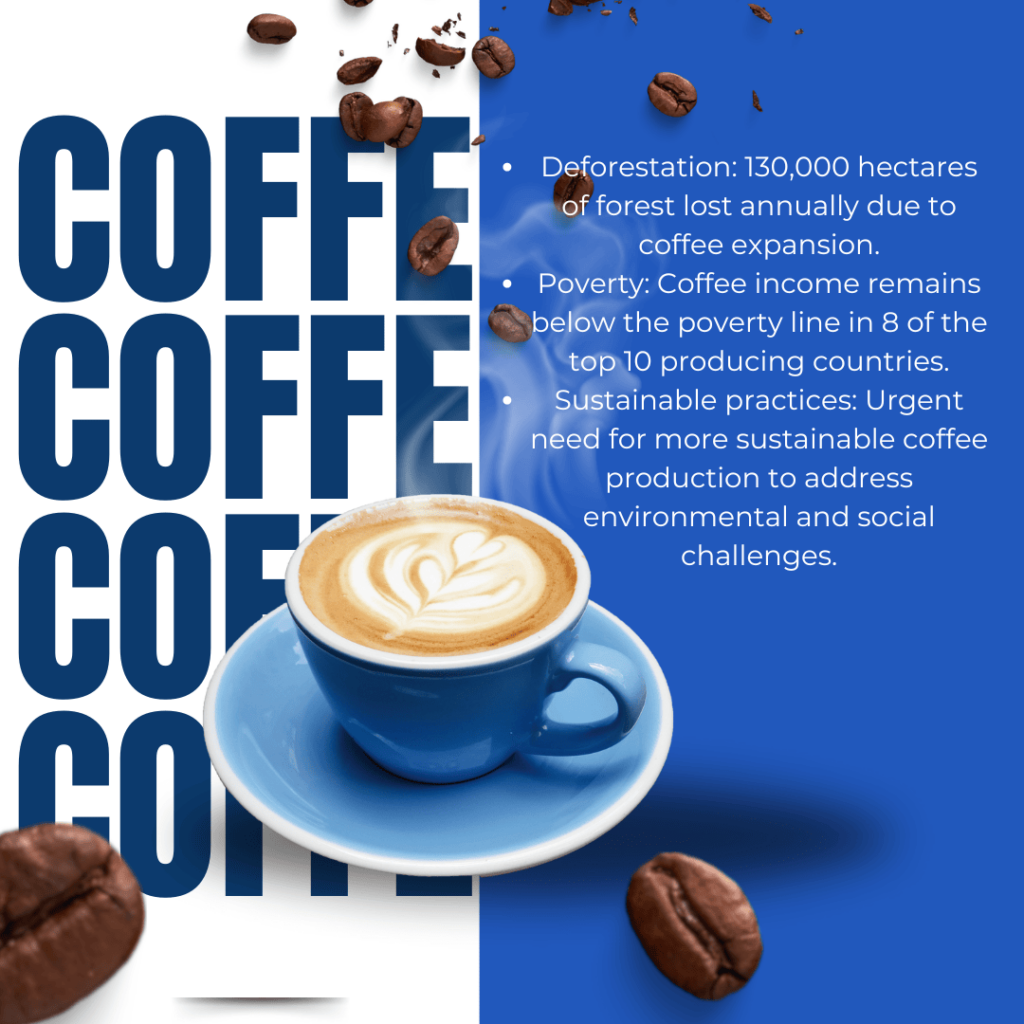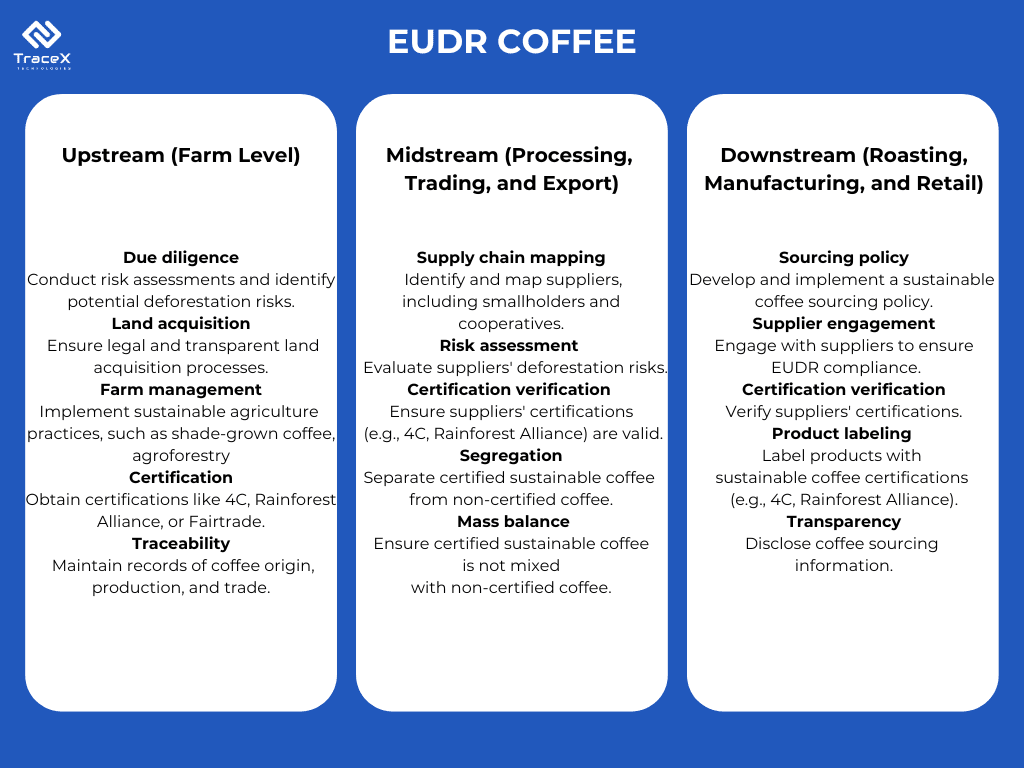Contact: +91 99725 24322 |
Menu
Menu
Quick summary: Discover how to achieve EUDR coffee compliance with our comprehensive guide. Learn about traceability, sustainable sourcing, and certifications to build a transparent and environmentally-friendly coffee supply chain. Enhance your market position and meet EU regulations effectively.

Imagine you’re a coffee producer who has worked tirelessly to build your business, cultivating rich, aromatic coffee beans that have become a staple for European consumers. Now, picture waking up to a new regulation—the European Union’s Deforestation Regulation (EUDR) and its stringent EUDR coffee compliance requirements—that could either propel your business into the future or halt your access to one of the most lucrative markets in the world. This is not a distant possibility; it’s the reality that many coffee producers face today.
So, why should coffee producers and suppliers care? The answer is simple,in today’s global market, where consumers are increasingly demanding transparency and sustainability, aligning with EUDR is not just about meeting legal obligations—it’s about future-proofing your business. But let’s face it, navigating these regulations can feel overwhelming, especially for smallholders who may lack the resources of larger corporations. Failure to comply doesn’t just risk fines; it risks your entire business. However, embracing EUDR coffee compliance opens doors to new opportunities, including premium market access, enhanced brand reputation, and stronger relationships with conscientious consumers.
Key takeaways
The European Union’s Deforestation Regulation (EUDR) represents a significant shift in how businesses, including those in the coffee sector, operate. At its core, the EUDR aims to prevent deforested or degraded land from entering the EU market, mandating that goods like coffee are traceable to their origin and certified as free from deforestation. For coffee producers, this means ensuring that every step of the supply chain adheres to stringent environmental standards, which includes robust documentation and traceability systems. Compliance isn’t just about paperwork; it’s about implementing systems that verify and validate your sustainability practices, making transparency and responsibility the cornerstones of your operations.
The EU represents approximately 20% of global coffee imports, making compliance essential for coffee exporters to avoid significant revenue losses.
The EUDR’s ripple effects are felt far beyond Europe, impacting global coffee trade dynamics. Coffee producers, particularly in regions like Africa and Latin America where deforestation risks are higher, face both challenges and opportunities. On one hand, the regulation introduces significant hurdles—ranging from the need for advanced traceability systems to potential increases in operational costs. For many small-scale farmers and cooperatives, this might seem daunting.
Coffee is a vital economic driver for millions of people worldwide, particularly in developing countries within the tropics. Cultivated on smallholder farms, coffee production supports the livelihoods of 25 million families. Women play a significant role in coffee production, accounting for up to 70% of the labor force on coffee farms.
On the other hand, the EUDR also opens doors to new opportunities. Producers who adapt successfully can differentiate themselves in a crowded market, appealing to European consumers who increasingly prioritize sustainability. Implementing EUDR compliance not only helps in accessing the EU market but can also enhance the overall sustainability of the coffee supply chain, fostering better practices and partnerships.
The global impact of the European Union Deforestation Regulation (EUDR) on coffee compliance is profound, particularly in coffee-producing regions such as Africa, Southeast Asia, and Latin America. As the EUDR mandates that coffee imported into the EU must be sourced from deforestation-free areas, it compels producers to adopt sustainable practices, which can significantly reshape local economies and ecosystems.
In regions like Africa, where coffee farming is a critical source of income for millions of smallholder farmers, compliance with the EUDR may require significant changes in agricultural practices. Farmers will need to invest in sustainable farming techniques, such as agroforestry and organic farming, to meet the EUDR’s requirements. While this transition may incur initial costs, it can ultimately lead to higher quality coffee and access to premium markets that prioritize sustainability. For example, countries like Ethiopia and Uganda, which are known for their high-quality Arabica coffee, could benefit from increased demand for sustainably sourced products.
In Southeast Asia, particularly in countries like Vietnam and Indonesia, the coffee industry is also facing pressures to comply with the EUDR. The regulation could incentivize the adoption of better agricultural practices, reducing reliance on harmful fertilizers and pesticides. This shift not only aligns with EUDR compliance but also enhances the resilience of coffee farms against climate change, potentially leading to more stable incomes for farmers.
Countries such as Brazil and Colombia, major coffee producers, are under pressure to ensure that their coffee supply chains do not contribute to deforestation. By enforcing compliance with the EUDR, these countries can promote sustainable land use practices that preserve vital ecosystems. This could lead to improved biodiversity, as sustainable coffee farming often incorporates practices that protect native flora and fauna.
Traceability in coffee refers to the ability to track and verify the journey of coffee beans from the farm where they were grown to the end consumer. Within the context of the European Union’s Deforestation Regulation (EUDR), traceability means ensuring that coffee is sourced from areas that are not subject to deforestation or land degradation. This requirement is critical because it not only helps meet regulatory compliance but also builds consumer trust. Knowing the exact origin of coffee beans and confirming that they have been produced sustainably is a key factor for consumers and businesses in today’s market.
Blockchain technology and other digital tools play a transformative role in enhancing traceability for EUDR compliance. Blockchain, with its decentralized and immutable ledger, allows every transaction and movement of coffee beans to be recorded in a secure and transparent manner. Each step in the supply chain—from farm to export—can be logged, providing an irrefutable record of the coffee’s journey.
Digital tools like satellite monitoring and IoT sensors further support this by providing real-time data on land use and environmental conditions. For instance, satellite imagery can monitor deforestation and land use changes, while IoT sensors on coffee farms can track sustainability practices and verify that they meet EUDR standards. These technologies not only ensure compliance but also offer a way to build stronger relationships with consumers by demonstrating commitment to sustainability.

Deforestation-free coffee sourcing involves several critical components to ensure that coffee production does not contribute to deforestation.
Together, these elements contribute to a coffee supply chain that is both environmentally responsible and compliant with evolving sustainability standards.
Implementing CSA practices can significantly aid coffee producers in meeting EUDR requirements. Here’s how:
Smallholder farmers often face significant challenges in achieving traceability. Many lack access to the necessary technology and resources to implement advanced tracking systems. This can be particularly challenging for those in remote areas with limited infrastructure.
Providing support through partnerships with NGOs, government programs, or tech companies can help bridge this gap. Simple, mobile-based apps that facilitate traceability without requiring extensive infrastructure can be an effective solution. These tools can enable farmers to log data easily and access necessary training and resources.
The cost associated with implementing and maintaining traceability systems can be prohibitive, especially for smaller operations.
Innovative financing options, such as low-interest loans or grants specifically designed for sustainability projects, can alleviate financial burdens. Additionally, sharing resources and infrastructure among local cooperatives can help distribute costs and make compliance more manageable.
Ensuring data accuracy and consistency throughout the supply chain is crucial but can be challenging. Errors or discrepancies can undermine the reliability of traceability systems.
Investing in user-friendly digital tools with built-in verification and validation features can improve data accuracy. Regular audits and training programs for all supply chain participants can also help maintain high data integrity standards.
By addressing these challenges with practical solutions, the coffee industry can enhance its traceability efforts, ensuring EUDR compliance and fostering a more sustainable and transparent supply chain.

TraceX EUDR Compliance Software is designed to help coffee producers and exporters meet the stringent requirements of the European Union’s Deforestation Regulation (EUDR). Here’s how it supports achieving EUDR compliance in coffee production:
By leveraging TraceX EUDR Compliance Software, coffee producers can streamline their compliance efforts, enhance traceability, and ensure that their operations meet the regulatory standards set by the EUDR. This not only facilitates market access to the European Union but also supports sustainable and responsible coffee production practices.
EUDR coffee compliance presents both challenges and opportunities for coffee producers committed to sustainability. By embracing rigorous traceability measures, obtaining relevant certifications, and integrating climate-smart practices, producers can not only meet regulatory requirements but also enhance their market position and contribute to environmental conservation. EUDR compliance is more than a regulatory obligation; it’s a pathway to building a more transparent, resilient, and sustainable coffee supply chain. As the demand for responsibly sourced coffee continues to grow, adopting these practices will not only align your operations with EU standards but also resonate with a global consumer base that values sustainability. Investing in compliance today paves the way for a future where coffee production supports both environmental stewardship and economic viability.
The EU Deforestation Regulation (EUDR) is a new legislation aimed at preventing the import of products linked to deforestation and forest degradation into the European Union. For the coffee industry, this means that companies must ensure that the coffee they source does not contribute to deforestation. This requires robust supply chain traceability, risk assessments, and due diligence processes to verify that the coffee is produced sustainably and complies with the EUDR requirements.
Achieving full traceability under EUDR involves mapping the entire coffee supply chain, from the farm to the final product. Companies need to collect and verify data on the origin of their coffee beans, ensure that each step in the supply chain meets sustainability criteria, and monitor for any risks of deforestation. Utilizing digital tools like blockchain technology, satellite monitoring, and supplier management systems can help automate and streamline this process, making it easier to maintain compliance with EUDR.
One of the key challenges is the complexity of the coffee supply chain, which often involves multiple intermediaries and regions of origin. Ensuring accurate and transparent data collection throughout the supply chain can be difficult, especially when dealing with smallholder farms. Additionally, the need to continuously monitor and assess risks, keep up with evolving regulations, and maintain comprehensive documentation can be resource-intensive. However, partnering with technology providers like TraceX can help overcome these challenges by offering tools and expertise to simplify the compliance process.
